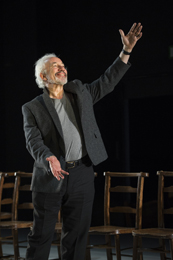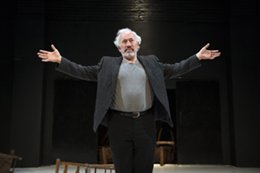He changed history, but it’s astonishing, when you stop to think about it, how little we actually know about Jesus. Virtually nothing about how he spent the first thirty years of his life, with details of his ministry drawn mainly from four canonical gospels written a minimum of five decades after the events depicted: the established facts are not compendious, and even the “known knowns” are doubted by some scholars to be historically accurate.
That’s the background against which Matthew Hurt’s new play The Man Jesus was written. As Hurt himself puts it, “When I was approached to write a play about Jesus, my initial thought was: I have no idea who this man is”.
 Hurt’s approach is to examine the historical Jesus (most commentators agree that he actually existed) tangentially, through the refracting perspectives of people recorded as having known him. Jesus himself never appears in the play, which is neatly appropriate – his physical representation on stage would inevitably lend semblances of certitude, where Hurt finds creative speculation a more honest, fruitful way of probing the truth behind the scanty strands of verifiable historical information.
Hurt’s approach is to examine the historical Jesus (most commentators agree that he actually existed) tangentially, through the refracting perspectives of people recorded as having known him. Jesus himself never appears in the play, which is neatly appropriate – his physical representation on stage would inevitably lend semblances of certitude, where Hurt finds creative speculation a more honest, fruitful way of probing the truth behind the scanty strands of verifiable historical information.
Hurt’s other major decision is to assign responsibility for portraying the characters he calls upon to volunteer their impressions of Jesus to a single actor, Simon Callow. He could have made few better choices: Callow is a celebrated exponent of the one-hander, his Dickens shows having garnered particular critical and popular acclamation.
Still, the ninety uninterrupted minutes of The Man Jesus are a tall order for any actor, however experienced, with so many different transformations to negotiate. Callow’s task is somewhat alleviated by the spareness of Fiammetta Horvat's set: a blank, black canvas on which his only physical task is to occasionally move around a collection of wooden chairs intially concealed behind the fire-doors at the rear of the stage area. The featureless spartan setting, and the fact that Callow is the only moving object that the audience has to fasten on, sharply focuses attention on Hurt’s investigation of the impact Jesus made on individuals with whom his life at some point intersected.
Hurt uses regional accents to signify the social and political status of his various “witnesses”, and Callow for the most part handles these effectively. His Mary, who starts the play, is working-class Yorkshire, and like many of the other characters bemusedly ignorant of the cosmic significance of the events that she is taking part in. Not so John the Baptist, however, whom Callow depicts as a fulminating, Billy Connolly soundalike, gruffly implacable in his fundamentalist certitudes. There are Liverpudlians too, and as good an impersonation of the Bible-based Ballymena vernacular as I’ve heard from an English actor.
 Most memorably of all there is Callow’s Pontius Pilate, conceived in Hurt’s script as a markedly intelligent individual all too aware of the extent to which his actions are determined by the dictates of the civil law, and the strictures of the political tightrope that he finds himself walking. Pilate plays out melodramatically for the audience the alternative courses of action he might conceivably follow, and in so doing makes it painfully apparent that his own thoughts or feelings about Jesus’s destiny have little part to play in the various decision-trees which lie before him. Callow relishes the absurdity of Pilate’s position, and his impotence, and shows graphically how the intangible but potent influences of historical (or divine) necessity can over-ride the will of individual people at key moments in human interaction.
Most memorably of all there is Callow’s Pontius Pilate, conceived in Hurt’s script as a markedly intelligent individual all too aware of the extent to which his actions are determined by the dictates of the civil law, and the strictures of the political tightrope that he finds himself walking. Pilate plays out melodramatically for the audience the alternative courses of action he might conceivably follow, and in so doing makes it painfully apparent that his own thoughts or feelings about Jesus’s destiny have little part to play in the various decision-trees which lie before him. Callow relishes the absurdity of Pilate’s position, and his impotence, and shows graphically how the intangible but potent influences of historical (or divine) necessity can over-ride the will of individual people at key moments in human interaction.
Do we, in the end, learn anything genuinely new about Jesus? One thing Hurt does project powerfully is the sheer force of Jesus’s personality, how disciples were magnetically compelled to abandon steady jobs and family to follow him, and how consistently he swam against the tide of contemporary expectations regarding how life should be lived and negotiated. Callow is outstanding, in his various guises, at conveying the crystal clarity with which these brilliantly unflinching messages were communicated, and how revolutionary they still seem in the twenty-first century. You get a vivid sense of Jesus’s greatness as a teacher, his extraordinarily ability to slice through cant, pretension and irrelevance to the enduring verities of human existence.
As such The Man Jesus is eminently a play worth seeing. Parts of it (it’s suggested at one point that Jesus was tipsy at a wedding) will no doubt raise the hackles of Biblical literalists, but Hurt’s deeper mission is fundamentally serious, respectful, and consistently thought-provoking. Callow was struggling through illness early in this Lyric Theatre run, but if I hadn’t known that I would still be wanting to call his performance heroic. He reaches the parts of historical characters that conventional written records find difficult to access and articulate, and does so in a moving and compassionate fashion.
Terry Blain is an arts journalist and cultural commentator, contributing regularly to BBC Music Magazine, Opera magazine, the Belfast Telegraph, Culture Northern Ireland and BBC Radio Ulster.